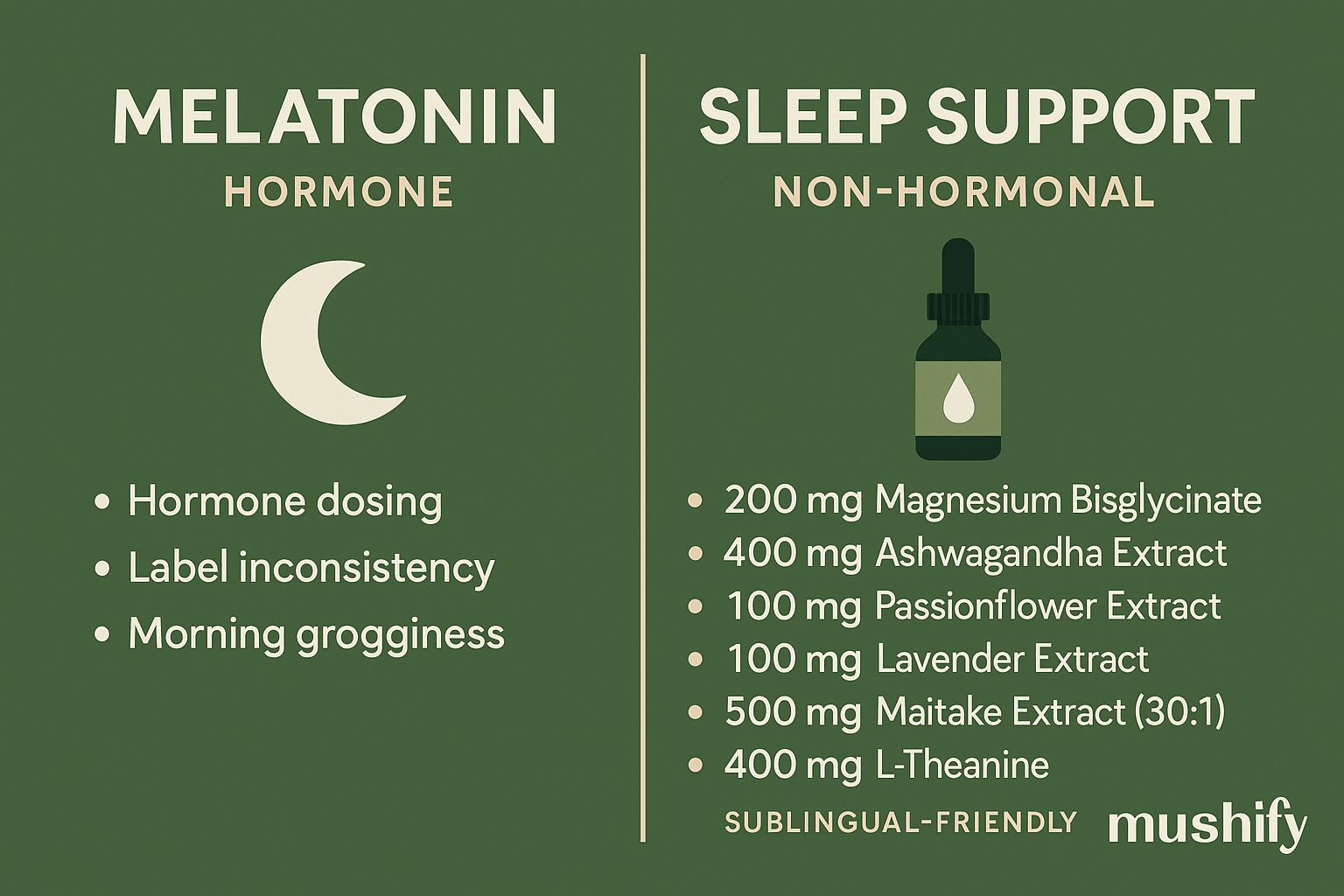Melatonin is a hormone. It can be useful for short-term circadian nudges (jet lag, shift work), but routine nightly use isn’t always ideal. Doses on shelves are often inaccurate, and melatonin interacts with other hormones (e.g., prolactin) and developing endocrine axes.
Sleep Support was formulated to promote natural sleep readiness without dosing an external hormone. Each serve provides:
-
Magnesium bisglycinate (200 mg)
-
Ashwagandha extract (400 mg)
-
Passionflower extract (100 mg)
-
Lavender extract (100 mg)
-
Maitake extract 30:1 (500 mg → 15,000 mg raw-equivalent)
-
L-theanine (400 mg)
Together, these support the systems that set up good sleep: stress regulation, relaxation signaling, autonomic balance, and nocturnal metabolic steadiness.
Why not lean on melatonin every night?
1) Label accuracy is shaky
Independent testing has found OTC melatonin products can contain anywhere from far below to >300% of the labeled dose (and sometimes undeclared CBD). That makes consistent outcomes—and safety—harder to control.
2) It is a hormone
Melatonin can influence other endocrine pathways. Reports and reviews note prolactin rises after melatonin dosing, and ongoing debate around developmental endocrine effects (e.g., puberty timing) underscores the need for caution with habitual use, especially in youth.
Bottom line: melatonin can help in targeted situations, but it’s not the only (or always the best) plan for building robust, repeatable sleep.
What Sleep Support does instead (and how each ingredient works)
Magnesium bisglycinate — calm-nervous-system mineral
Magnesium participates in GABAergic and NMDA receptor regulation and helps lower cortical “noise.” Bisglycinate pairs magnesium with glycine (itself a sleep-supportive amino acid) and is gentle on the gut. In RCTs, magnesium improved insomnia metrics (sleep time, sleep onset latency) versus placebo in older adults and in pilot adult trials.
Why it’s here: foundational; supports relaxation physiology without sedation.
Ashwagandha (Withania somnifera) — stress resilience → better sleep
Ashwagandha is an adaptogen with human data for sleep quality, sleep efficiency, and reduced sleep latency, likely via modulation of the HPA axis and GABA signaling. Meta-analyses and RCTs (including actigraphy-verified trials) show small-to-moderate improvements in subjective and objective sleep outcomes.
Why it’s here: dials down stress arousal that blocks sleep pressure.
Passionflower (Passiflora incarnata) — gentle anxiolytic, PSG-measured sleep gains
Passionflower interacts with GABA receptors. In a double-blind, placebo-controlled study with polysomnography, passionflower increased total sleep time and improved sleep indices versus placebo over two weeks.
Why it’s here: takes the “edge” off pre-sleep rumination.
Lavender (Lavandula angustifolia) — autonomic calm
Oral lavender (e.g., Silexan) and aromatherapy have shown anxiolytic effects in randomized trials; network meta-analysis supports benefit for anxiety symptoms (which often co-travel with insomnia). Reduced anxious arousal makes it easier to fall and stay asleep.
Why it’s here: calms the sympathetic system; pairs well with ashwagandha and theanine.
Maitake (Grifola frondosa) 30:1 — metabolic steadiness & immune rhythm
Maitake’s β-glucan-rich extracts modulate immune tone and show promising effects on glucose regulation in preclinical and early human work (e.g., improved insulin sensitivity, better glucose tolerance). Night-time glycemic swings are a quiet sleep disrupter; steadier metabolism supports fewer nocturnal awakenings.
Why it’s here: not a sedative—supports restorative sleep by smoothing metabolic noise.
Potency note: our 30:1 extract means 500 mg extract ≈ actives from ~15 g raw maitake (liberated and concentrated), rather than intact cell-wall bulk. (Extraction concentrates β-glucans that are otherwise trapped in chitin.)
L-theanine (400 mg) — alpha-wave relaxation without grogginess
Theanine increases alpha-wave activity and modulates glutamate/GABA balance. A 2025 systematic review/meta-analysis (18 RCTs) found theanine improved sleep quality across diverse groups, with typical effective doses 200–400 mg.
Why it’s here: smooths mental chatter and shortens sleep latency—no hangover.
Why a multi-pathway stack beats a single sleep hormone
-
Broader coverage: stress axis, autonomic balance, cortical excitation, and nocturnal metabolism—not just one hormone pulse.
-
Non-sedating: encourages natural sleep architecture rather than forcing sedation.
-
Consistency: no dependency on exogenous hormone timing or dose variability. (Melatonin gummies can vary wildly from label claims.)
How to use Sleep Support
-
Take 1 serve ~30–60 minutes before bed.
-
Pair with light hygiene (bright morning light; low blue light at night), a cool, dark room, and consistent sleep/wake times.
-
If you’re jet-lagged or on shift work, support circadian anchors (light and meal timing).
-
If pregnant, breastfeeding, on medication, or managing a condition, chat with your clinician first.
Quick FAQ
“Is melatonin ever appropriate?”
Yes—targeted, short-term use for circadian phase issues (e.g., jet lag) can help under professional guidance. For nightly long-term sleep, we prefer non-hormonal support that respects endogenous rhythms and avoids endocrine ambiguity.
“Will I feel groggy?”
Sleep Support is designed to reduce arousal rather than sedate. Most users report smoother sleep onset and fewer awakenings—without a morning fog (individuals vary).
References (selected, recent)
-
Erland, L.A.E. & Saxena, P. (2023). Quantity of melatonin and CBD in melatonin gummies. JAMA. (Dose variability). JAMA Network
-
Mole, B. (2023). Melatonin gummies can be off by up to 350%. Ars Technica (news on JAMA paper). Ars Technica
-
Venaki, E. et al. (2024). Melatonin’s actions are not limited to sleep; prolactin elevation discussion. World Journal of Meta-Analysis. WJGnet
-
Händel, M.N. et al. (2023). Adverse effects of melatonin in children/adolescents. EClinicalMedicine (The Lancet). (Long-term safety uncertainty; puberty concerns cited in EU report). The Lancet+1
-
Abbasi, B. et al. (2012). Magnesium improves insomnia in elderly (DB-RCT). Journal of Research in Medical Sciences. Semantic Scholar
-
Pratte, M.A. et al. / Langade, D. et al.; pooled in ashwagandha sleep meta-analysis (2021). Sleep Medicine Reviews. (Improved sleep quality & latency). Accurate Clinic
-
Ngan, A. & Conduit, R. (2011); Passionflower and PSG outcomes replicated in 2020 DB-RCT. Complement Ther Med / 2020 trial. SciSpace
-
Yap, W.S. et al. (2019). Lavender (Silexan) network meta-analysis (anxiety reduction). Scientific Reports. Nature
-
Zhang, Y. et al. (2025). L-theanine and sleep: systematic review & meta-analysis (18 RCTs). Sleep Medicine Reviews. ScienceDirect
-
Gu, Y. et al. (2024). Grifola frondosa polysaccharide improves insulin resistance (preclinical). npj Science of Food. Plus reviews on mushroom β-glucans → immune/metabolic modulation. Nature+1


